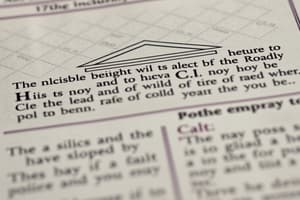Podcast
Questions and Answers
Where did accounting as an activity originate?
Where did accounting as an activity originate?
- Iran
- Mesopotamia (correct)
- Egypt
- Rome
What is credited to the Phoenicians?
What is credited to the Phoenicians?
- Employing the first accountants
- Developing a system of debits and credits
- Inventing double-entry bookkeeping
- Creating an alphabetic system for bookkeeping (correct)
Who is considered the father of modern accounting?
Who is considered the father of modern accounting?
- A Babylonian accountant
- Geovanni Farolfi
- Amatino Manucci
- Luca Pacioli (correct)
What was the title of Luca Pacioli's book published in 1494?
What was the title of Luca Pacioli's book published in 1494?
Who is credited with inventing the double-entry principle?
Who is credited with inventing the double-entry principle?
Where was the double entry bookkeeping system first documented?
Where was the double entry bookkeeping system first documented?
What led to the need for more advanced accounting systems?
What led to the need for more advanced accounting systems?
In which year did the Institute of Chartered Accountants in England and Wales emerge?
In which year did the Institute of Chartered Accountants in England and Wales emerge?
What was the main reason for the petition to Queen Victoria?
What was the main reason for the petition to Queen Victoria?
What skills, in addition to mathematical skills, were required to be a professional accountant?
What skills, in addition to mathematical skills, were required to be a professional accountant?
Flashcards are hidden until you start studying
Study Notes
Historical Development of Accounting
- Accounting's history dates back thousands of years to Mesopotamia, developing alongside writing, counting, and money.
- Early civilizations, such as ancient Egyptians and Babylonians, created auditing systems, while the Romans collated detailed financial information.
- Around 300 BC, accountants were employed in Iran, using tokens and bookkeeping scripts.
- The Phoenicians invented an alphabetic system for bookkeeping around the first millennium, with the ancient Egyptians possibly assigning someone the role of comptroller.
Luca Pacioli and the Development of Modern Accounting
- Luca Pacioli, an Italian, is considered the father of modern accounting, publishing the first textbook in accounting in 1494.
- Pacioli's book, "Summa de Arithmetica, Geometria, Proportioni et Proportionalita", described the system of double-entry bookkeeping used by Venetian merchants.
- Although Pacioli did not invent accounting or the double-entry principle, he was the first to describe the system of debits and credits in journals and ledgers.
- Amatino Manucci, a bookkeeper, is believed to have invented the double-entry principle in the 12th century.
Accounting as a Profession
- The modern profession of accounting has its roots in Scotland in the mid-1800s, with the Institute of Accountants in Glasgow petitioning Queen Victoria for a Royal Charter.
- The petition led to the establishment of the first professional accounting body, the Institute of Chartered Accountants of Scotland (ICAS).
- The Institute of Chartered Accountants of England and Wales (ICAEW) was established later, allowing accountants to distinguish themselves from solicitors.
- In 1854, the institute adopted 'chartered accountant' for its members, a term that still carries legal weight globally today.
- The petition highlighted the varied skills required to be a professional accountant, including mathematical skills, knowledge of general legal principles, and the ability to give evidence on financial matters.
Studying That Suits You
Use AI to generate personalized quizzes and flashcards to suit your learning preferences.




